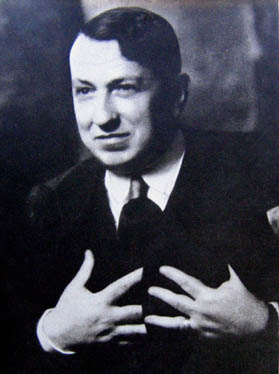Queer Places:
Cimetière de Bagneux
Bagneux, Departement des Hauts-de-Seine, Île-de-France, France
 Francis
Carco (born François Carcopino-Tusoli) (July 3, 1886 – May 26, 1958) was a French author, born
at Nouméa, New Caledonia. In recounting the story of a teenage male hustler in
Jesus-la-Caille (1910), Carco portrayed the world of crime, prostitution and
homosexuality that flourished in the Montmartre district of early 20th century
Paris.
Francis
Carco (born François Carcopino-Tusoli) (July 3, 1886 – May 26, 1958) was a French author, born
at Nouméa, New Caledonia. In recounting the story of a teenage male hustler in
Jesus-la-Caille (1910), Carco portrayed the world of crime, prostitution and
homosexuality that flourished in the Montmartre district of early 20th century
Paris.
Francis Carco was a poet, belonging to the Fantaisiste school, a novelist,
a dramatist, and art critic for L'Homme libre and Gil Blas. During World
War I he became an aviation pilot at Étampes,
after studying at the aviation school there. His works are picturesque,
painting as they do the street life of Montmartre,
and often being written in the argot of Paris.
He has been called the "romancier des apaches." His memoir, The Last Bohemia:
From Montmartre to the Latin Quarter,[1] contains
reminiscences of Bohemian life
in Paris during the early years of the 20th century.
He had an affair with the
short story writer Katherine
Mansfield in February 1915. The narrator Raoul Duquette of her story Je
ne parle pas français (who has a cynical attitude to love and sex) is
partly based on him, and her story An
Indiscreet Journey is based on her journey through the war zone to spend
four nights with Corporal Francis Carco near Gray.
She saved as a memento of him a fake letter from "Julie Boiffard" asking her
to visit (which is now held in the Turnbull
Library). She also wrote a letter to her husband from Carco's Paris flat
on 8/9 May 1915.[2]
Carco held the ninth seat at Académie
Goncourt from 1937–1958. He is buried in the Cimetière
de Bagneux.
My published books:


BACK TO HOME PAGE

 Francis
Carco (born François Carcopino-Tusoli) (July 3, 1886 – May 26, 1958) was a French author, born
at Nouméa, New Caledonia. In recounting the story of a teenage male hustler in
Jesus-la-Caille (1910), Carco portrayed the world of crime, prostitution and
homosexuality that flourished in the Montmartre district of early 20th century
Paris.
Francis
Carco (born François Carcopino-Tusoli) (July 3, 1886 – May 26, 1958) was a French author, born
at Nouméa, New Caledonia. In recounting the story of a teenage male hustler in
Jesus-la-Caille (1910), Carco portrayed the world of crime, prostitution and
homosexuality that flourished in the Montmartre district of early 20th century
Paris.
